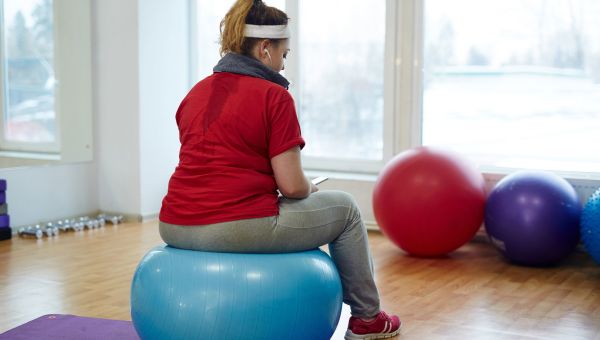Nutritionist Deepak Khera explains why a woman might have difficulty losing weight, and what she can do about it.
Is there an ideal weight for women?

In terms of pounds, there is no ideal weight for anyone. It is, however, possible to determine someone’s health by calculating their BMI. When we have too much body fat, it is harmful to our health.
Height and weight are used to calculate BMI. Healthy ranges are between 18.5 and 25. Overweight is defined as having a BMI between 25 and 29. Obesity is defined as a BMI over 30.
To find your own BMI, click to use this calculator.
Although this post focuses on the health effects of high BMI, it is important to note that low BMI (less than 18.5) can also cause health problems. Deficiencies in nutrients or osteoporosis may result.
What causes obesity?
Researchers have identified several factors that can contribute to obesity, although there is no single cause. These include:
- Sleep deprivation, including fewer hours, poor sleep quality, and irregular sleep patterns
- Nighttime artificial light
- Physical activity and healthy food are limited in environments with limited access
- Obesity in families and genetics, including certain DNA changes passed down from generation to generation
- Getting older

Click for Obesity Diet Program
What are the health risks of obesity in women?
Overweight men and women are at greater risk for a variety of health problems. There are, however, some conditions related to weight that are specific to women. Obese women are more likely to suffer from the following health problems and risks.

1. Higher risk of cancer
- Cancer rates that are related to weight are higher in women than in men.
- At least 13 types of cancer are more likely to develop in obese women, including endometrial, ovarian, and postmenopausal breast cancers.
2. Problems in pregnancy
- Diabetes diagnosed during pregnancy, also known as gestational diabetes.
- A serious blood pressure condition that occurs during pregnancy is preeclampsia
- It is difficult to get a good ultrasound and measure the baby’s heart rate
3. Problems in labor and delivery
- Longer labor
- There is an increased risk of having to have a cesarean section
- There is a higher risk of bleeding and infection during C-sections
4. Fertility problems (difficulty getting pregnant)
Obese women often have polycystic ovary syndrome (PCOS), a hormone disorder that causes infertility and disrupts menstruation.
5. Pelvic floor disorders
Extra weight can cause problems with controlling urine and keeping organs in place by pressing on the pelvic organs.
Fat is stored differently in men and women, which also makes a huge difference. Women carry fat in their thighs and butts, while men carry fat in their abdomens. Despite being more dangerous for health, abdominal fat is easier to burn. As compared to women, men can lose weight faster even with minimal effort.
Reasons that make weight loss harder for woman!
Clinical Nutritionist and Dietician in Mumbai, Deepak Khera, says there are several reasons why women may struggle to lose a few pounds, while men seem to do it effortlessly.

The main reasons are as follows
1. Low testosterone:
Weight loss is difficult when testosterone levels are low. According to her, men who received testosterone replacement injections lost an average of 20% of their body weight over the course of 11 years in a study.
2. Body composition:
The lean mass of men is greater than that of women, while the fat mass of women is greater than that of men. Most men accumulate adipose tissue around their trunks and abdomens, while women’s is typically found around their hips and thighs.
3. Women usually have less muscle
Since muscle increases the resting metabolic rate, men burn more calories throughout the day than women because they have less muscle mass. Muscle requires more energy than fat. Physiological activities such as breathing and digesting food burn calories even when you’re at rest.
You burn more calories even when you don’t do anything when you have more lean mass. To lose weight, women must adjust their calories appropriately because they have less lean mass.
4. There’s a difference between food cravings
There are likely women in your life who love chocolate, but you’re unlikely to know a man who does. Women are more likely to crave sugary, high-carbohydrate foods than men. There is a gender difference in food preferences that makes it difficult for women to lose weight, according to clinical research. During certain stages of the menstrual cycle, women are especially prone to craving sweet foods due to their sexual hormones.
DfabU’s doctors are experts in weight loss and offer individualized weight loss programs that take food cravings into account. To curb cravings, they recommend strategies like stabilizing your blood sugar after a thorough evaluation.
Emotional eating plays a role as well. Emotional eating is more prevalent in women than in men. During the monthly menstrual cycle, the temptation is even greater. Weight loss goals can be sabotaged by women caving into their cravings. Diet plans are more likely to be followed by men.
5. Hormonal fluctuations:
Hormones play an important role in maintaining muscle mass, burning fat, and coping with stress and hunger in the body. When hormonal imbalances occur, losing weight becomes much more challenging.
Over the course of a lifetime, women’s hormone levels undergo many changes. Take a look at these three very different scenarios during a woman’s lifetime. A woman’s weight can be affected by each of these factors.
- Menstrual cycles:
During women’s menstrual cycles, hormone levels change. Calorie intake and metabolism are affected by this. You may feel less full because estrogen affects another hormone called cholecystokinin. The body burns more energy when progesterone levels are high. - Pregnancy:
Gaining weight during pregnancy is normal, but it can be dangerous. When you gain too much weight during pregnancy, you are more likely to keep that excess weight for several years afterwards. - Menopause:
During menopause, a woman’s body no longer produces estrogen. As a result, women have a different distribution of fat, with more fat around their midsections (like men). After menopause, women tend to lose muscle mass and gain fat.
Whether you struggle to give up your favorite foods or work out till your legs give way, DfabU can give you a fresh perspective on weight loss. With DfabU, you can experience the fun side of fitness and dieting!
6. Menopause
It may also be more challenging for women going through menopause to lose weight than for men in the same age group. It is common for women to gain extra body fat during menopause and perimenopause (the period leading up to menopause).
One of the factors contributing to weight gain is the drop in estrogen levels. Female sex hormones are estrogen and progesterone. Weight gain is not directly caused by its low levels. It does, however, contribute to an increase in abdominal and body fat.
Menopause is also associated with weight gain due to normal aging processes and poor lifestyle choices. Women who go through menopause tend to become less active, resulting in a lower metabolism.
7. Polycystic Ovary Syndrome (PCOS)
Infertility in women is caused by PCOS, a hormonal disorder. Although it affects women of childbearing age, it can last for years. Weight loss is harder for women with PCOS because they tend to carry extra weight.
Besides being difficult to lose, this weight has also been linked to diabetes risk, heart disease risk, and metabolic syndrome issues. PCOS symptoms can be relieved by losing 5% of your body fat.
“Women do have larger fat stores than men, but this is due to their physiology, not weight gain. Even if a woman is “in perfect physical condition”, she will have “6 to 11 percent more body fat than a man” if she has 11 percent more body fat than a man.
Women typically have a harder time losing weight and inches than men. The reason for this is in part due to men’s higher resting metabolic rate and lean muscle mass. A woman’s thighs, buttocks, and hips store more fat than a man’s, which makes weight loss more difficult for her. Furthermore, female hormones promote fat storage, and fat takes up more space than muscle.
If you are struggling with weight loss, you can take consultation from the renowned dietician in Mumbai & Navi Mumbai – Deepak Khera, who can help you with your weight loss.


